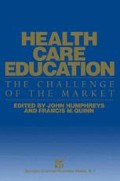Abstract
In August 1989 the UKCC, the statutory body for nurses, midwives and health visitors charged with maintaining and improving standards of education and practice, launched a major project on post-registration education and practice (PREP) (UKCC, 1990). The project report stated that changes in the patterns of health and disease; together with changing institutional arrangements, which include new styles of clinical management, etc, require a concomitant change in the nature of post-registration education and practice. Recognition was given to the effect on education provision of the new ethos of purchaser and providers as the use of contracts is extended to the provision of education.
The focus of this first case study is the joint development of a credit scheme for nursing and midwifery awards be Ween the University of Greenwich and the Princess Alexandra and Newham College of Nursing and Midwifery. The chapter exposes the shortcomings of the orthodox educational paradigm in accommodating a flexible, work-focused approach to learning and describes the development of an innovative credit accumulation and transfer (CAT) scheme that includes the first ENB Higher Award pathway to become operational in England.
Access this chapter
Tax calculation will be finalised at checkout
Purchases are for personal use only
Preview
Unable to display preview. Download preview PDF.
References
Benner, P. (1984) From Novice to Expert, Addison Wesley, California.
Bloor, M. and Butterworth, C. (1990) Realising human potential. Aspects of Education Technology, 24.
CNAA (Council for National Academic Awards) (1987) Credit Accumulation and Transfer Regulations, CNAA, London.
Davies, C. (1990) The Collapse of the Conventional Career — The Future of Work and its Relevance for Post-registration Education in Nursing, Midwifery and Health Visiting, English National Board for Nursing, Midwifery and Health Visiting, London.
Dearden, G. (1991) The Credit Rating of ln-company Courses, HMSO, London.
ENB (English National Board for Nursing, Midwifery and Health Visiting) (1991) Framework for Continuing Professional Education for Nurses, Midwives and Health Visitors: Guide to Implementation, ENB, London.
Eraut, M. (1992) Developing a professional knowledge base: a process perspective on professional training and effectiveness, in Learning to Effect — Annual SRHE Conference, (ed. R.A. Barnett).
Foreman-Peck L. (1993) Enterprise education. Vocational Aspects of Education, 45(2), 99–111.
Further Education Staff College (1989) A Guide to Work Based Learning Terms, Further Education Staff College, Blagdon, Avon.
Gibbs, G. (1988). Learning by Doing — A Guide to Teaching and Learning Methods, Further Education Unit, London.
Gorringe, R. (1989). Accreditation of Prior Learning Achievements: Developments in Britain and Lessons from the USA, Further Education Staff College, Blagdon, Avon,
Jarvis, P. (1983) Professional Education, Croom Helm, Beckenham, Kent.
Jessup, G. (1991) Outcomes: NVQs and the Emerging Model of Education and Training. The Falmer Press, London.
Kolb, D. and Fry D. (1985) Towards an applied theory of experiential learning, in Theories of Group Processes, (ed. C. Cooper), John Wiley & Sons, Chichester.
Kremer-Hayon, L. (1990) Reflection and professional knowledge, in Insight into Teachers’ Thinking and Practice, (eds C. Day, M. Pope and P. Denicolo), The Falmer Press, London.
Land, R. (1991) Rationale for a PGCE, Thames Polytechnic Validation Office, London.
Otter, S. (1992) Learning Outcomes in Higher Education, Unit for the Development of Adult Continuing Education, London.
NCVQ (National Council for Vocational Qualifications) (1991). Guide to National Vocational Qualifications, NCVQ, London.
Schon, D. (1983) The Reflective Practitioner — How Professionals Think in Action, Basic Books, London.
SEEC (South East England Consortium for Credit Accumulation and Transfer) (1990) Report of National Conference on CATS in Practice held May 1990. SEEC, London.
UKCC (1990) Report of the Post Registration Education and Practice Project, United Kingdom Central Council for Nursing, Midwifery and Health Visiting, London.
Editor information
Rights and permissions
Copyright information
© 1994 Springer Science+Business Media Dordrecht
About this chapter
Cite this chapter
Thomson, V., Hall, D. (1994). Case study: a credit scheme for nurses and midwives. In: Humphreys, J., Quinn, F.M. (eds) Health Care Education. Springer, Boston, MA. https://doi.org/10.1007/978-1-4899-3232-7_3
Download citation
DOI: https://doi.org/10.1007/978-1-4899-3232-7_3
Publisher Name: Springer, Boston, MA
Print ISBN: 978-0-412-57500-6
Online ISBN: 978-1-4899-3232-7
eBook Packages: Springer Book Archive

